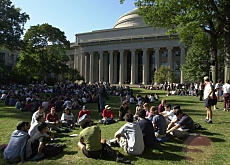
swiss talents call boston home

The Boston area is a magnet for scientists and researchers drawn to its high-powered universities and top-notch research facilities.
swissinfo caught up with two Swiss scientists to find out what benefits they derive from working in the United States.
Olivier de Weck is an assistant professor at the Massachusetts Institute of Technology (MIT) in Cambridge. For the past 12 years, he’s called the US home and teaches courses at MIT’s engineering systems division.
He first made his way to the US as part of a Swiss government team working on a fighter jet project. When that ended, he decided to pursue a PhD at MIT, which led to his current position.
His neat office is in one of the university’s older buildings. It is a relaxed but studious place with a comfy couch and an electronic white board. A model F/A 18 warplane sits on the coffee table.
For Olivier, being Swiss has been an
advantage in his work. “I have been able to use some of things I learnt in Switzerland to be successful here,” he told swissinfo.
“It’s things like a certain level of precision, persistence, or the fact that living in a multicultural environment taught me to look at things from multiple viewpoints. I can ask myself if a result I get is the only possible answer.”
Cultural divide
The researcher, who is also an American citizen, says he has no problem bridging the cultural divide.
“When I get out of the plane in Zurich, I feel right at home, and it’s the same when I return to Boston,” he added. “It allows me to
combine the best aspects of life in Switzerland and New England, and I don’t feel torn apart.”
Olivier says the biggest advantage of working in America – and particularly MIT – is the feeling he can change things.
“The research you do here is relevant, has real-world implications. We don’t deal with nice hypothetical problems that have no applications.”
Nouchine Hadjikhani has been working at the Harvard Medical School since 1997, where she studies the human brain at the Martinos Center for Biomedical Imaging.
Her small cluttered office at the old
Charlestown navy yard has an unhindered view of Boston across the harbour.
An assistant professor in radiology, she runs a small team of researchers whose work on disorders such as migraine and autism needs to be constantly funded.
Recently, it has been a major concern since government money for life sciences has been drying up despite increased research spending.
Tightrope act
“I have a title at Harvard, but that doesn’t give me a salary or guaranteed funding,” she said. “It’s a kind of tightrope act without a net
to catch me.”
This isn’t necessarily a disadvantage though and can even be stimulating. “It forces me to be at my best and make interesting discoveries,” she adds.
She admits being a foreigner also has its drawbacks.
“You speak differently, you think differently, you don’t know how to sell yourself, so it can be a steep learning curve at the beginning to survive in this environment,” she told swissinfo.
So what about returning home to teach? For the time being it’s not an option for Olivier, who says there are too many public and commercial projects for him to work on in
America.
For Nouchine though, heading back to Switzerland is now on the cards after being awarded a four-year professorship grant from the Swiss National Science Foundation.
She will pursue her work on autism, starting with a part-time appointment, at Lausanne’s Federal Institute of Technology. But she won’t be cutting her ties with Boston.
“There is an open-mindedness and dynamism I need here,” she said. “And there’s no way I would want to stop collaborating with one of the world’s best imaging centres.”
swissinfo, Scott Capper in Boston
Olivier de Weck, is one of two MIT professors chosen to lead Nasa’s “Interplanetary Supply Chain Management and Logistics Architectures” project.
Its aim is to figure out how to get goods from suppliers to the Moon or Mars.
The main challenge is to constitute a complex supply network on the ground and in space.
Nouchine Hadjikhani’s research is devoted to two areas of interest: the pathophysiology of migraine and the understanding of neurodevelopmental disorders, especially autism.
These two areas of interest stem from her background in visual system studies.
For her research, she uses a variety of neuroimaging techniques and she reckons she’s spent more time inside a medical scanner than anyone she knows.
23% of all PhD holders (258,300) employed by academic institutions in the United States were foreigners in 2003.
This share rises to 44% in computer science and 40% in engineering, but drops to 9% in psychology.
23% of all PhD holders (258,300) employed by academic institutions in the United States were foreigners in 2003.
This share rises to 44% in computer science and 40% in engineering, but drops to 9% in psychology.
Foreigners constitute 20% of full-time senior faculty.
But they represent nearly half of computer science faculty, but less than 10% of those in psychology.
There is no official figure for the number of Swiss scientists in the US, but estimates have put it as high as 8,500.

In compliance with the JTI standards
More: SWI swissinfo.ch certified by the Journalism Trust Initiative




























You can find an overview of ongoing debates with our journalists here . Please join us!
If you want to start a conversation about a topic raised in this article or want to report factual errors, email us at english@swissinfo.ch.